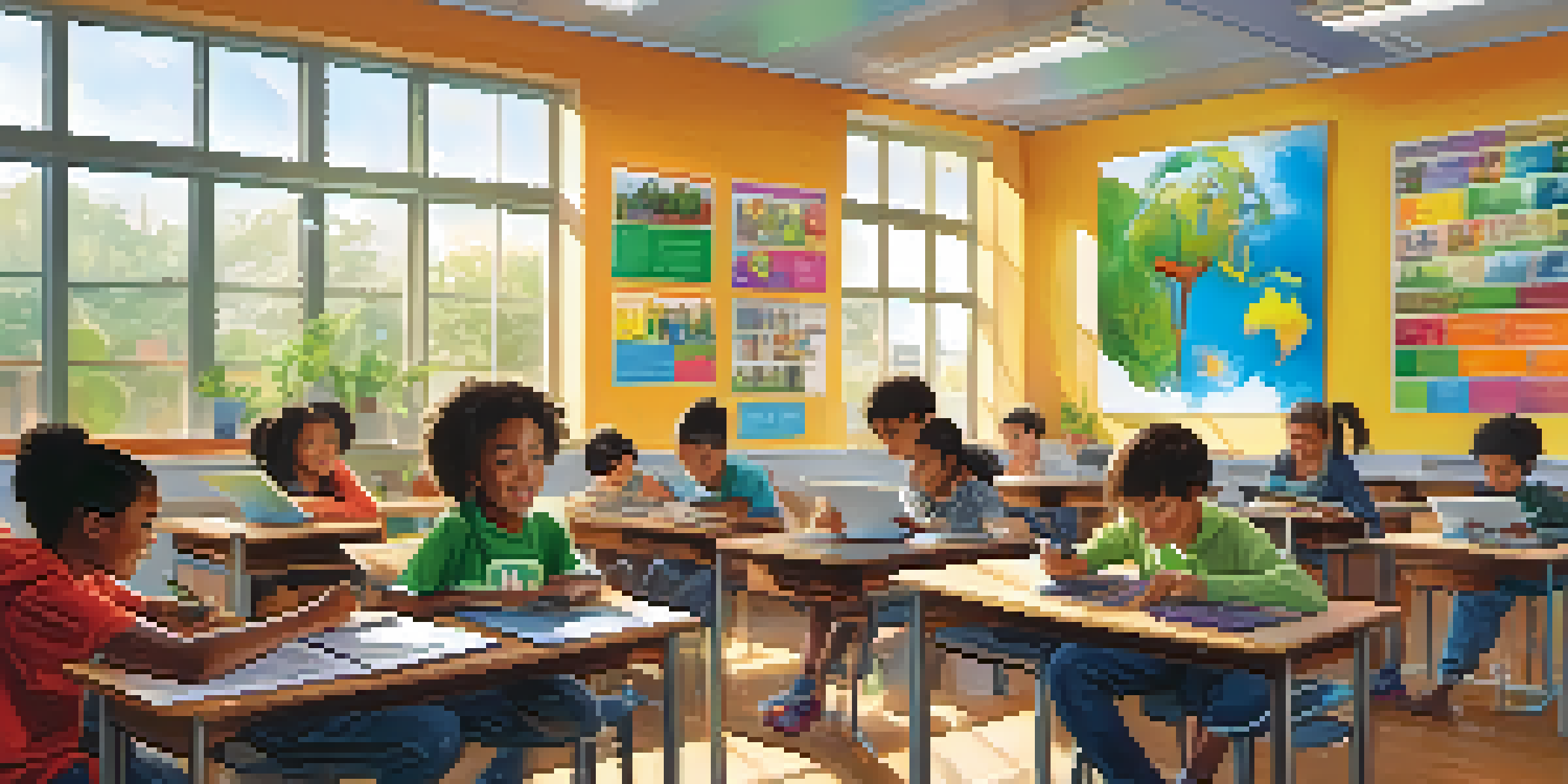Innovative Teaching Methods in Jersey City's Education System

Embracing Technology in the Classroom
Jersey City schools are increasingly integrating technology into their teaching methods. This shift allows students to engage with interactive lessons that cater to various learning styles. For instance, using tablets and smart boards, teachers can present information in dynamic ways that capture students' attention.
Technology is best when it brings people together.
Furthermore, educational apps and online resources provide students with personalized learning experiences. This approach enables learners to progress at their own pace, fostering both independence and confidence. As a result, students are more engaged and motivated to explore subjects deeply.
The use of technology also prepares students for a future where digital literacy is essential. By making technology an integral part of education, Jersey City is equipping its young minds with the skills they need to thrive in an increasingly digital world.
Project-Based Learning in Action
Project-based learning (PBL) is another innovative method gaining traction in Jersey City schools. This approach encourages students to work on real-world projects, promoting critical thinking and collaboration. For example, students might partner with local organizations to tackle community issues, allowing them to apply their knowledge in meaningful ways.

Through PBL, students learn to manage their time, conduct research, and present their findings. This hands-on experience not only deepens their understanding of the subject matter but also helps them develop essential life skills. Working as a team, they learn from each other and build a supportive learning environment.
Technology Enhances Learning
Jersey City schools are integrating technology to create engaging, interactive lessons that cater to diverse learning styles.
Moreover, PBL fosters a sense of ownership over their education. When students see the tangible results of their work, they feel a greater connection to what they're learning, which often leads to improved academic performance and enthusiasm for school.
Mindfulness and Social-Emotional Learning
Recognizing the importance of mental health, Jersey City's education system is incorporating mindfulness and social-emotional learning (SEL) into the curriculum. These practices help students develop emotional intelligence, resilience, and empathy, which are crucial for their overall well-being. Schools often implement mindfulness exercises, such as meditation or deep-breathing activities, to help students manage stress.
The beautiful thing about learning is that no one can take it away from you.
By prioritizing SEL, educators aim to create a supportive and inclusive school environment. This focus not only enhances students' emotional health but also improves academic outcomes, as emotionally stable students are more likely to engage in their studies. Teachers are trained to recognize signs of emotional distress and provide appropriate support.
This holistic approach to education acknowledges that students' emotional and social needs are just as vital as their academic ones. In doing so, Jersey City is not only nurturing well-rounded individuals but also fostering a positive school culture that encourages collaboration and respect.
Culturally Responsive Teaching Practices
Culturally responsive teaching (CRT) is being embraced in Jersey City schools to ensure that all students feel valued and understood. This method recognizes the diverse backgrounds of students and incorporates their cultures into the curriculum. By doing so, teachers can create lessons that resonate with students' experiences and perspectives.
For example, literature classes might include authors from various cultural backgrounds, allowing students to see themselves represented in the materials they study. This not only boosts engagement but also fosters a sense of belonging and inclusivity among students. When students feel connected to the content, they're more likely to participate actively in discussions.
Community Partnerships Enrich Education
Collaboration with local organizations provides Jersey City students with valuable resources and real-world experiences.
Additionally, CRT encourages educators to reflect on their own biases and adapt their teaching methods accordingly. This ongoing process helps create a more equitable learning environment where every student has the opportunity to succeed, regardless of their cultural background.
Flipped Classrooms: A New Learning Paradigm
The flipped classroom model is another innovative approach being adopted in Jersey City. In this setup, traditional teaching methods are reversed: students learn new content at home through video lectures or readings, while class time is reserved for discussions and hands-on activities. This allows teachers to provide more personalized support during class.
By flipping the classroom, students can learn at their own pace, reviewing lessons as needed before coming to class. This method not only maximizes classroom time but also encourages students to take responsibility for their learning. They can engage in deeper discussions and collaborative activities that reinforce their understanding of the material.
Moreover, this approach fosters a more interactive and engaging learning environment. Teachers can address individual student needs more effectively, providing targeted support where it's needed most. As a result, students feel more empowered and invested in their education.
Collaborative Learning: Strength in Numbers
Collaborative learning is gaining popularity in Jersey City schools, emphasizing the importance of teamwork in the learning process. Students work together in groups to solve problems, conduct research, or complete projects, which fosters a sense of community and shared responsibility. This method encourages peer learning, where students can teach and learn from one another.
In a collaborative setting, students are exposed to diverse perspectives and ideas, enhancing their critical thinking skills. For example, a group tasked with a science project might brainstorm various approaches, leading to creative solutions that they wouldn't have arrived at individually. This not only builds their knowledge but also strengthens their communication and interpersonal skills.
Focus on Social-Emotional Learning
Incorporating mindfulness and social-emotional learning helps Jersey City students develop crucial emotional intelligence and resilience.
Furthermore, collaborative learning helps students develop essential soft skills, such as conflict resolution and leadership. These skills are invaluable in both academic and real-world contexts, preparing students for future success in their careers and personal lives.
The Role of Community Partnerships
Community partnerships play a vital role in enhancing Jersey City’s education system. By collaborating with local organizations, schools can provide students with additional resources and real-world experiences that enrich their learning. For instance, partnerships with businesses can lead to internship opportunities, giving students hands-on experience in their fields of interest.
Moreover, community involvement fosters a sense of shared responsibility for education. Parents and community members are encouraged to participate in school activities, creating a supportive network around students. This collaboration not only strengthens the bond between schools and the community but also enhances student achievement.

Ultimately, these partnerships provide students with a broader perspective on their education. By connecting classroom learning to the outside world, Jersey City schools prepare students to become informed and engaged citizens who contribute positively to their communities.